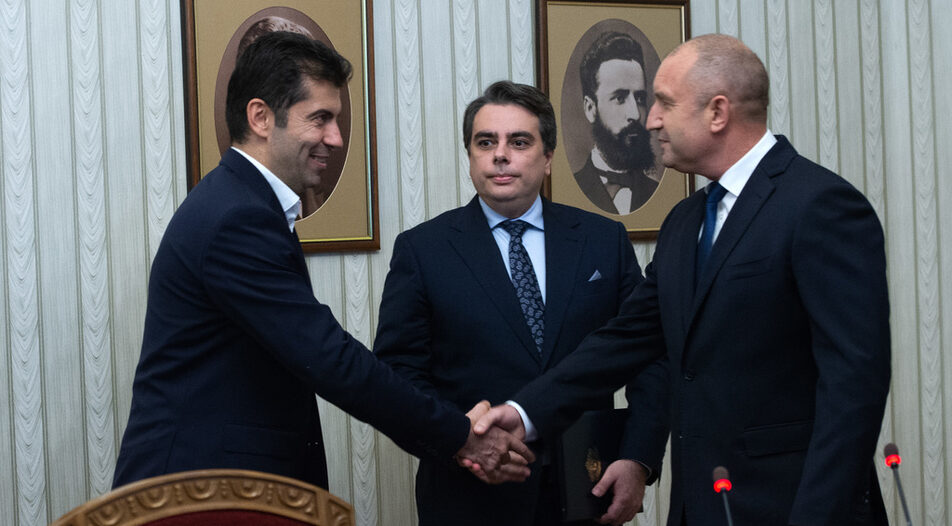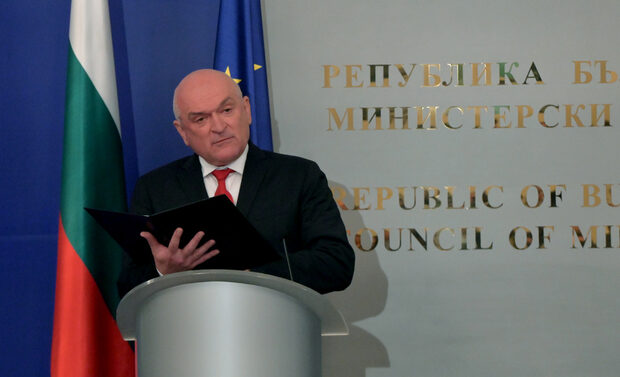"In this parliament, the number of MPs willing to support change is 117. I hope that after the next elections voters will choose four more," outgoing Finance Minister Assen Vassilev and WCC co-chair told reporters last Friday, just before handing back the first exploratory mandate to form a cabinet to President Rumen Radev - unfulfilled. After spending just under a week trying to seek support from 121 MPs for his proposed cabinet, Mr Vassilev abandoned the idea of taking it to Parliament for approval, as he knew that the numbers simply weren't there.
So, despite three parliamentary elections last year, Bulgarians will most likely head to the polls again this autumn. To be more precise - in early October, as President Radev said on Monday. But before it comes to the early election, there are still several (although highly unlikely) possibilities for forming a cabinet within the current parliament. The ball is in the President's court once again and he will have to select one of them - which will signal the side he wants to take in the ongoing clash between the "change" and the status-quo.
Who (doesn't) want to form a government?
The Constitution stipulates that the second mandate has to go to the second largest party in Parliament, which currently is the former ruling GERB formation of ex-Prime Minister Boyko Borissov. It appears, however, that it will not even attempt to seek support for a cabinet, just like it did in the summer of 2021, when it returned the exploratory mandate to Mr Radev immediately upon receiving it.
If you wonder why GERB does not want power, especially after successfully pushing through a vote of no-confidence against the Petkov cabinet, the answer is simple: Mr Borissov does not want to take any responsibility for ruling the country at a time of war in the region, and just when the looming energy crisis hits later this year. Or, in his own words: "Who would take on cleaning the bog [the current government] left? Even I, with all my experience, would certainly not!"
This means that the only possibility for a new cabinet within the current Parliament remains with the third mandate. Who is willing to try their luck with it?
On Friday, Democratic Bulgaria co-chair Hristo Ivanov expressed his formation's readiness to take the mandate and attempt to gather broader support, including from the TISP party, which triggered the current political crisis by leaving the coalition. The proposal he offered is for a "technocratic cabinet without notable political figures in it," leaving the door open for negotiations between WCC and TISP, which insisted that its support was contingent on Assen Vassilev and Kiril Petkov taking no role in governance.
The fourth party in the former coalition - BSP - also expressed its willingness to support the Democratic Bulgaria option, or offered to take the third mandate and try to somehow bring WCC and TISP together.
The two factions' good intentions could come to naught, however, in the face of WCC's growing penchant for an early vote in October, as described in a Facebook post on Friday by outgoing Prime Minister Kiril Petkov. This throws the third mandate into the realm of pure theory.
President weighs in
Despite the slim chance of success, President Rumen Radev will still have to choose which faction will receive the third exploratory mandate. And while the decision might be purely symbolic, it will certainly give the public some indication of Mr Radev's own future ambitions.
In the current situation, the President has three separate options.
The first one is that he sticks to tradition and passes the mandate to the third largest faction in Parliament, which is MRF. This is highly unlikely, as the party is even more politically isolated than GERB at the moment, and has not shown much appetite to try to form a cabinet.
The second option is for Mr Radev to give the mandate to TISP. If he decides to do so, this would be a clear sign he is distancing himself from WCC (which was dubbed his own baby by opponents last year) and is taking the side of the "anti-government coalition" of GERB, MRF and Vazrazhdane, which helped Slavi Trifonov's party bring down the Petkov cabinet. It would be very strange if TISP attempted to form a formal coalition with the three former opposition parties, but they could seize a last opportunity to stay in the game, especially given their plunging prospective election score (see graph).
The last - and least harmful - option is for the President to pass the mandate to BSP and Democratic Bulgaria, who will likely make a (futile) attempt to bring WCC and TISP together.
And what about the timing?
The first signs coming from the presidency are that Mr Radev will try to be constructive - both in terms of who he decides to give the mandate to, and the date he chooses for the election.
The head of state announced that if the second mandate to form a government is returned unfulfilled, he will invite all parliamentary parties for consultations before choosing who to hand over the third mandate to. At these meetings they will be able to propose formulas for a way out of the ongoing crises, as well as priorities around which to seek unity.
As for the election's timing of the upcoming election, it appears that the President is seeking a pragmatic approach designed to boost turnout. "If Parliament is dissolved before the end of July, this means elections will be held in September, which poses a risk of low turnout. On the other hand, prolonging the procedure for forming a government too long leads to temptation for gambling on government decisions and personnel changes, and the parties themselves drawing thicker and thicker red lines between themselves. This will make the formation of a government more and more difficult after the potential early elections," Mr Radev said on Tuesday.
In any case, the head of state appears reluctant to push for very early elections - he, alongside most parties - wants to see Parliament pass some key legislation that would unclog the process of receiving the Resilience and Recovery Plan funds as soon as possible. But, sooner or later, he will have to expedite the process - and likely set a new and unpredictable cycle of elections in motion. Or, as Democratic Bulgaria's Hristo Ivanov warned: "If we go to elections and these once again don't give a clear answer to how this country would be governed, we will enter a steady and unpredictable spiral of destabilization."
"In this parliament, the number of MPs willing to support change is 117. I hope that after the next elections voters will choose four more," outgoing Finance Minister Assen Vassilev and WCC co-chair told reporters last Friday, just before handing back the first exploratory mandate to form a cabinet to President Rumen Radev - unfulfilled. After spending just under a week trying to seek support from 121 MPs for his proposed cabinet, Mr Vassilev abandoned the idea of taking it to Parliament for approval, as he knew that the numbers simply weren't there.
So, despite three parliamentary elections last year, Bulgarians will most likely head to the polls again this autumn. To be more precise - in early October, as President Radev said on Monday. But before it comes to the early election, there are still several (although highly unlikely) possibilities for forming a cabinet within the current parliament. The ball is in the President's court once again and he will have to select one of them - which will signal the side he wants to take in the ongoing clash between the "change" and the status-quo.












